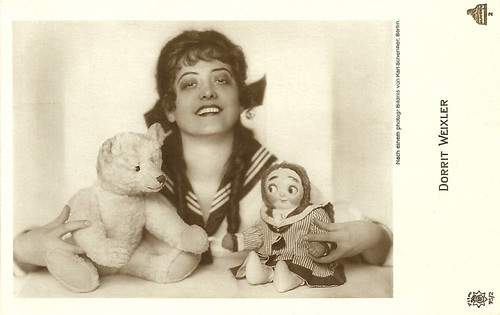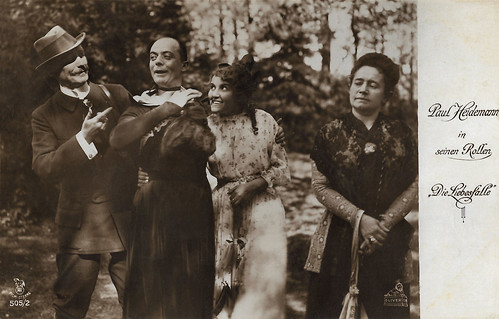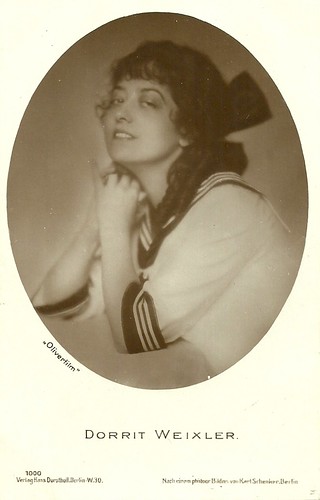Today, we have postcards of silent films of the little-known German company Oliver-Film. It was the company of Austrian-born film pioneer David Oliver (1880-1947), who produced over 200 silent films in the 1910s and early 1920s. His grandson, Canadian actor and film producer Mark Oliver, made for HBO the interesting documentary UFA MAN... The Story of Movie Pioneer David Oliver about the life and work of his grandfather. So, who was David Oliver?
![Dorrit Weixler]()
German postcard in the Film-Sterne series by Rotophot, no. 75/2. Photo: Karl Schenker, Berlin / Oliver-Film, no. 2. Dorrit Weixler.
![Erika Glässner in Das Wäschermädel Seiner Durchlaucht (1917)]()
German postcard in the Film-Sterne series by Rotophot, no. 504. Photo: Oliver-Film. Erika Glässner in the silent comedy Das Wäschermädel Seiner Durchlaucht/His Highness's Washing Lady (Danny Kaden, 1917), co-starring Gustav Botz and Karl Beckersachs.
![Paul Heidemann in Die Liebesfalle (1917)]()
German postcard by Rotophot in the Film Sterne series, no. 505/2. Photo: Oliver-Film. Paul Heidemann in Die Liebesfalle (N.N., 1917).
David Oliver was born David Olivenbaum, in 1880, in Unizh, Western Galicia (then Austria-Hungary, now Ukraine). He was of the Jewish faith.
To avoid the pogroms that flared up again and again in his homeland, he turned west and opened a cinema in Bremen in 1905, after he had recognised the business opportunities that this new form of entertainment offered him.
Successful as a film salesman, he then built large cinema palaces in Hanover, Dresden, Halle, and above all in Leipzig. Ten years later, he owned his own film company.
When the First World War broke out in 1914, his company, the Berlin Oliver-Film GmbH, controlled around 25 percent of the German film market.
Oliver also headed the Nordische Films Co., so he was head of the German distribution organisation of Nordisk Film, which had been operating in Copenhagen since 1906, and for which top film workers such as Urban Gad, Valdemar Psilander and Asta Nielsen worked or had worked.
![Dorrit Weixler]()
German postcard by Verlag Hans Dursthoff, Berlin, no. 996. Photo: Karl Schenker, Berlin / Oliver-Film. Dorrit Weixler.
![Dorrit Weixler]()
German postcard by Verlag Hans Dursthoff, Berlin, no. 997. Photo: Karl Schenker, Berlin / Oliver Film. Dorrit Weixler.
![Dorrit Weixler]()
German postcard by Verlag Hans Dursthoff, Berlin, no. 1000. Photo: Karl Schenker, Berlin / Oliver Film. Dorrit Weixler.
![Dorrit Weixler]()
German postcard in the Film-Sterne series by Rotophot, no. 75/3. Photo: Karl Schenker, Berlin / Oliver-Film, 3. Dorrit Weixler.
The Berlin Oliver-Film GmbH produced feature films and documentaries. One of the stars was the Berlin actress Dorrit Weixler, with whom several films were made from 1915 onward, often comedies with her first name in the title.
Another prominent star of Oliver-Film was Hilde Wörner, while the comedians Paul Heidemann (known as Paulchen and Teddy), Erika Glässner, Herbert Paulmüller, Melitta Petri, and Leo Peukert were less frequent stars.
Oliver also produced some detective films with Max Landa, such as Der Mann ohne Kopf/The man without a head (Louis Neher, 1916) and Der Hund mit dem Monokel/The dog with the monocle (Felix Basch, 1916).
The documentaries of Oliver-Film included images of nature and landscapes from the near as well as the more distant surroundings, city portraits as well as general or popular educational character and war reports.
In the Spring of 1915, Oliver acquired Paul Davidson's entire chain of Union theaters. Together with Emil Georg von Stauß and Alexander Grau, he was one of the founding fathers of Ufa in November 1917, after Nordisk had teamed up with other German film companies and the Supreme Army Command under General Erich Ludendorff had given their blessing.
![Paul Heidemann in Die Liebesfalle (1917)]()
German postcard by Rotophot in the Film Sterne series, no. 505/1. Photo: Oliver-Film. Paul Heidemann in Die Liebesfalle (N.N., 1917).
![Leo Peukert, Melita Petri and Herbert Paulmuller]()
German postcard by Photochemie, Berlin, no. K. 1935. Photo: Oliver-Film, Berlin. Leo Peukert, Melitta Petri and Herbert Paulmüller
![Leo Peukert, Melitta Petri, Herbert Paulmüller in Wer niemals einen Rausch gehabt (1918)]()
German postcard by Photochemie, Berlin, no. K. 2631. Photo: Oliver-Film, Berlin. Leo Peukert, Melitta Petri and Herbert Paulmüller in Wer niemals einen Rausch gehabt/Who never had an intoxication (Heinrich Bolten-Baeckers, 1918).
![Leo Peukert, Melitta Petri and Herbert Paul Müller in Wer niemals einen Rausch gehabt (1918)]()
German postcard by Photochemie, Berlin, no. K. 2632. Photo: Oliver-Film, Berlin. Leo Peukert, Melitta Petri and Herbert Paulmüller in Wer niemals einen Rausch gehabt/Who never had an intoxication (Heinrich Bolten-Baeckers, 1918).
In the 1920s, David Oliver shifted the focus of his ventures from film production to the rental and theatre business. In Berlin-Charlottenburg he had Hans Poelzig build the Capitol Theater with over 1,300 seats. It opened on 20 December 1925 with the film The Thief of Bagdad (Raoul Walsh, 1924) starring Douglas Fairbanks.
In 1929 Oliver was involved in the construction of what was then the largest movie palace in Europe with 2,667 seats, the magnificent Ufa-Palast in Hamburg.
On 1 April 1933, UFA dismissed all employees of Jewish descent, including Oliver. On 21 March 1934, somebody threw a hand grenade to a taxi in which Oliver was sitting. Oliver remained unharmed but decided to emigrate to Spain.
There he was able to found his own company again, the Iberica Films, and produced some films with it. But he had to flee again after the outbreak of the Civil War in 1936 and the rise of fascism in Spain. This time he moved to England.
In London he helped Alexander Korda, who was himself an immigrant, to set up Denham Studios, which were the most modern studio facilities in the United Kingdom at the time. Until his death, Oliver was head of Denham Studios Laboratories there.
David Oliver died in 1947 in London-Pancras. He was 67 years old. His grandson Mark Oliver (1966) is an actor and film producer in Canada. In 2013 he shot the documentary UFA MAN... The Story of Movie Pioneer David Oliver for HBO about the life and work of his grandfather.
![Max Landa]()
German postcard by Rotophot in the Film Sterne Series, Berlin-Wilm., no. 80/2. Photo: Karl Schenker, Berlin / Oliver-Film, no. 2. Max Landa.
![Max Landa]()
German postcard by Rotophot in the Film Sterne series, Berlin-Wilm., no. 80/3. Photo: Karl Schenker, Berlin / Oliver-Film, no. 3. Max Landa.
![Hilde Wörner]()
German postcard by Photochemie, Berlin, no. K 2034. Photo: Oliver-Film. Hilde Wörner in Baronin Kammerjungfer/Baroness Kammerjungfer (Leo Peukert, 1917).
![Hilde Wörner in Der siebente Kuß (1918)]()
German postcard by Photochemie, Berlin, no. K. 2660. Photo: Oliver-Film. Hilde Wörner in Der siebente Kuß/The Seventh Kiss (Marie Luise Droop, 1918).
Sources: John Mackie (Vancouver Sun), Wikipedia (German), and IMDb.

German postcard in the Film-Sterne series by Rotophot, no. 75/2. Photo: Karl Schenker, Berlin / Oliver-Film, no. 2. Dorrit Weixler.

German postcard in the Film-Sterne series by Rotophot, no. 504. Photo: Oliver-Film. Erika Glässner in the silent comedy Das Wäschermädel Seiner Durchlaucht/His Highness's Washing Lady (Danny Kaden, 1917), co-starring Gustav Botz and Karl Beckersachs.

German postcard by Rotophot in the Film Sterne series, no. 505/2. Photo: Oliver-Film. Paul Heidemann in Die Liebesfalle (N.N., 1917).
The business opportunities for a new form of entertainment
David Oliver was born David Olivenbaum, in 1880, in Unizh, Western Galicia (then Austria-Hungary, now Ukraine). He was of the Jewish faith.
To avoid the pogroms that flared up again and again in his homeland, he turned west and opened a cinema in Bremen in 1905, after he had recognised the business opportunities that this new form of entertainment offered him.
Successful as a film salesman, he then built large cinema palaces in Hanover, Dresden, Halle, and above all in Leipzig. Ten years later, he owned his own film company.
When the First World War broke out in 1914, his company, the Berlin Oliver-Film GmbH, controlled around 25 percent of the German film market.
Oliver also headed the Nordische Films Co., so he was head of the German distribution organisation of Nordisk Film, which had been operating in Copenhagen since 1906, and for which top film workers such as Urban Gad, Valdemar Psilander and Asta Nielsen worked or had worked.

German postcard by Verlag Hans Dursthoff, Berlin, no. 996. Photo: Karl Schenker, Berlin / Oliver-Film. Dorrit Weixler.

German postcard by Verlag Hans Dursthoff, Berlin, no. 997. Photo: Karl Schenker, Berlin / Oliver Film. Dorrit Weixler.

German postcard by Verlag Hans Dursthoff, Berlin, no. 1000. Photo: Karl Schenker, Berlin / Oliver Film. Dorrit Weixler.

German postcard in the Film-Sterne series by Rotophot, no. 75/3. Photo: Karl Schenker, Berlin / Oliver-Film, 3. Dorrit Weixler.
One of the founding fathers of Ufa
The Berlin Oliver-Film GmbH produced feature films and documentaries. One of the stars was the Berlin actress Dorrit Weixler, with whom several films were made from 1915 onward, often comedies with her first name in the title.
Another prominent star of Oliver-Film was Hilde Wörner, while the comedians Paul Heidemann (known as Paulchen and Teddy), Erika Glässner, Herbert Paulmüller, Melitta Petri, and Leo Peukert were less frequent stars.
Oliver also produced some detective films with Max Landa, such as Der Mann ohne Kopf/The man without a head (Louis Neher, 1916) and Der Hund mit dem Monokel/The dog with the monocle (Felix Basch, 1916).
The documentaries of Oliver-Film included images of nature and landscapes from the near as well as the more distant surroundings, city portraits as well as general or popular educational character and war reports.
In the Spring of 1915, Oliver acquired Paul Davidson's entire chain of Union theaters. Together with Emil Georg von Stauß and Alexander Grau, he was one of the founding fathers of Ufa in November 1917, after Nordisk had teamed up with other German film companies and the Supreme Army Command under General Erich Ludendorff had given their blessing.

German postcard by Rotophot in the Film Sterne series, no. 505/1. Photo: Oliver-Film. Paul Heidemann in Die Liebesfalle (N.N., 1917).

German postcard by Photochemie, Berlin, no. K. 1935. Photo: Oliver-Film, Berlin. Leo Peukert, Melitta Petri and Herbert Paulmüller

German postcard by Photochemie, Berlin, no. K. 2631. Photo: Oliver-Film, Berlin. Leo Peukert, Melitta Petri and Herbert Paulmüller in Wer niemals einen Rausch gehabt/Who never had an intoxication (Heinrich Bolten-Baeckers, 1918).

German postcard by Photochemie, Berlin, no. K. 2632. Photo: Oliver-Film, Berlin. Leo Peukert, Melitta Petri and Herbert Paulmüller in Wer niemals einen Rausch gehabt/Who never had an intoxication (Heinrich Bolten-Baeckers, 1918).
The largest movie palace in Europe
In the 1920s, David Oliver shifted the focus of his ventures from film production to the rental and theatre business. In Berlin-Charlottenburg he had Hans Poelzig build the Capitol Theater with over 1,300 seats. It opened on 20 December 1925 with the film The Thief of Bagdad (Raoul Walsh, 1924) starring Douglas Fairbanks.
In 1929 Oliver was involved in the construction of what was then the largest movie palace in Europe with 2,667 seats, the magnificent Ufa-Palast in Hamburg.
On 1 April 1933, UFA dismissed all employees of Jewish descent, including Oliver. On 21 March 1934, somebody threw a hand grenade to a taxi in which Oliver was sitting. Oliver remained unharmed but decided to emigrate to Spain.
There he was able to found his own company again, the Iberica Films, and produced some films with it. But he had to flee again after the outbreak of the Civil War in 1936 and the rise of fascism in Spain. This time he moved to England.
In London he helped Alexander Korda, who was himself an immigrant, to set up Denham Studios, which were the most modern studio facilities in the United Kingdom at the time. Until his death, Oliver was head of Denham Studios Laboratories there.
David Oliver died in 1947 in London-Pancras. He was 67 years old. His grandson Mark Oliver (1966) is an actor and film producer in Canada. In 2013 he shot the documentary UFA MAN... The Story of Movie Pioneer David Oliver for HBO about the life and work of his grandfather.

German postcard by Rotophot in the Film Sterne Series, Berlin-Wilm., no. 80/2. Photo: Karl Schenker, Berlin / Oliver-Film, no. 2. Max Landa.

German postcard by Rotophot in the Film Sterne series, Berlin-Wilm., no. 80/3. Photo: Karl Schenker, Berlin / Oliver-Film, no. 3. Max Landa.

German postcard by Photochemie, Berlin, no. K 2034. Photo: Oliver-Film. Hilde Wörner in Baronin Kammerjungfer/Baroness Kammerjungfer (Leo Peukert, 1917).

German postcard by Photochemie, Berlin, no. K. 2660. Photo: Oliver-Film. Hilde Wörner in Der siebente Kuß/The Seventh Kiss (Marie Luise Droop, 1918).
Sources: John Mackie (Vancouver Sun), Wikipedia (German), and IMDb.